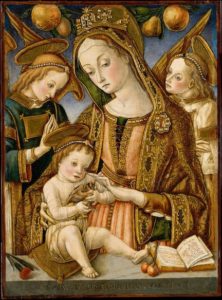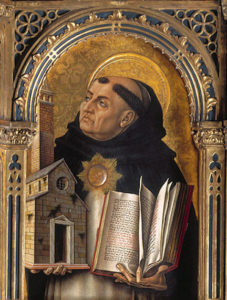Queen of Angels
There is an ongoing dispute among Californian history buffs regarding the original name of the city of Los Angeles. After looking into these squabbles, I’ve concluded that the best answer is from Doyce Nunis, former editor of the Historical Society’s journal, the Southern California Quarterly. Nunis refers to a 1785 California map, in which Los Angeles appears under the title El Pueblo de la Reyna de los Angeles (“The Town of the Queen of the Angels”). Other variations are favored by historians, some mentioning the Rio de Porciuncula (now the Los Angeles River), some mentioning “Our Lady Queen of the Angels,” etc. – but just minor variations on the name.
Los Angeles was my hometown for about twenty-five years. As a young man with an unmanageable variety of interests, I had difficulty, like many others, of settling on a career. Eventually, since philosophy is tailor-made for those with multiple interests, I entered graduate school for philosophy, and as a Latinist one of my initial research interests was Thomas Aquinas’ philosophy of the angels, as expounded in the Summa Theologiae, the De substantiis separatis, the De spiritualibus creaturis, and other works. This research eventually resulted in my first book, and quite a few articles.
But for a Catholic philosopher considering Mariology, the scholastic theories concerning angels pose some problems, in particular with regard to the common honorific of Mary as “Queen of the Angels.”

For one thing, there is the problem of angelic numerosity. Thomas Aquinas and other scholastics debated about how angels, if they were pure spirits, could be numbered and “individuated.” Concrete material distinctions seem to be necessary for counting and separating things. Aquinas proposed that angels are not individualized by matter, but by their form or “species.” Thus, unlike the billions of humans who all belong to one species, every angel is a distinct species – one as different from the other as a rose differs from a tiger and from a human being. And there may be an almost infinite “number” of angelic species!
So when we’re talking about Our Lady as “Queen of the Angels,” we are referring to a human being governing an incalculable magnitude of spiritual beings.
How could a human being, even a saint, know and influence such a multitude? Aquinas solved this issue regarding the similar influence of angels such as Seraphim and Cherubim in the highest “orders,” over angels and archangels, etc. in the lower orders. His solution was that angels, unlike humans, do not have temporally advancing “discursive” knowledge, but simple instantaneous intuitions, so that higher angels influence lower angels through simpler and more universal intellectual cognitions. Thus, as pure spirits, they have mental operations like God, who knows and governs everything through one simple all-encompassing act, numbering the very hairs on our head, and keeping track of each sparrow. (Lk. 12:6-7)
Following the reasoning of Aquinas, regarding the “how” question, we would probably conclude that this Woman, Queen of the Angels, perhaps knows and influences these myriads of angelic hosts in a “simpler and more universal” manner, similar to the way that the “choirs” of angels operate. And – more important to us – Mary, designated as our mother by Jesus on the Cross, and designated by Pope Paul VI at Vatican II as “Mother of the Church” – would have knowledge of, and influence on, each and every one of us in the same simple intuitive fashion.
Still, even granting the unfathomable power of God, how could any saint, even in the context of great saints, possess such greatness and such power?
In Mary’s case, of course, part of the explanation has to be related to her Immaculate Conception. Original sin and the obstacles we pose to the grace of God explain why so few attain sanctity. Just consider what would be the case if there were no such obstacles.

The late Fr. Andrew Greeley, with whom I didn’t always agree, in his book Jesus, makes a memorable point about the generosity of God. He portrays God as a desire-crazed suitor who wants to share as much of himself as possible with everyone – “a God who, for some god-forsaken reason, is crazy in love with you.” Jesus (Lk. 6:38 and Jn. 10:10) says as much about his desire to impart overflowing measures of spiritual life, gifts, and graces.
And, perhaps even more important, we must consider the Christian notion of divinization – which is the “other side of the coin” of Jesus’ Incarnation. As some Patristic commentators have put it, Jesus became man so that we could in effect become gods. This is strongly emphasized in Eastern Catholic and Orthodox churches and is called theosis.
In John 10:34-35, Jesus responds to critics of his claim to divinity by citing Psalm 81:
Is it not written in your law: “I said you are gods?” If it calls them gods, to whom the word of God came, and the scripture cannot be set aside – can you say that the one whom the Father has consecrated and sent into the world blasphemes because I said, “I am the Son of God?”
St. Augustine comments on this passage: “If men by partaking of the word of God were made gods, much more is the Word of which they partake, God.”
The ultimate divinization of those who hear the Word of God and keep it is also attested to in 1Jn. 3:2, which speaks about eventually being “like God”; and in Acts 17:28, Paul assures the Athenians that the notion of their poets about being “God’s offspring” is correct, and divinity is not something unattainable.
So Mary is not alone. All those who attain to the Kingdom of Heaven will be divinized, with godlike knowledge and powers. Thus the Church is perfectly justified in requiring authenticated miracles before the canonization of saints.
And we should therefore not be surprised that the Queen of Heaven, in response to skeptics, should perform the greatest miracle since the Resurrection at Fatima on October 13, 1917.
© 2017 The Catholic Thing. All rights reserved. For reprint rights, write to: info@frinstitute.org The Catholic Thing is a forum for intelligent Catholic commentary. Opinions expressed by writers are solely their own.
No comments:
Post a Comment